Products and Services
Consulting Service
IPS Inc. has been providing ERP (Enterprise Resource Planning) systems of SAP (SAP SE), the world market leader in enterprise application software, to mid-sized and growing companies in Japan, and has been meeting the expectations of customers for IT utilization in their business transformation. Recently, as the Asian director of United VARs, SAP’s global partner network, we have been providing consulting services and SAP ERP implementation, utilization, and operation services to companies in over 100 countries around the world. Our mission is to help our clients build their IT capabilities, implement and utilize ERP, and reform their management and business operations.
Consistent Commitment to Organizations Moving Forward
The economic environment for Japanese companies is changing drastically due to dizzying technological developments and geopolitical concerns in other countries. We understand that many of you are preparing for all kinds of changes and are aiming to review and improve your company’s internal systems, business models, and organizations over the long term. Our service policy at IPS is to continue to contribute to the evolution of our customers by providing IT technology, systems, and consulting services.
Service and Product Lineup
Aiming for “Customer Success”, not “System Implementation”
As the term “Enterprise Resource Planning” indicates, ERP implementation is a management tool. Therefore, the key factor in choosing ERP is its feasibility for the management issues of the company that will be using it. As such , we provide comprehensive services and IT solutions to help our customers plan ERP implementation correctly, implement it safely, and use it to solve their business challenges.
SAP Solution Implementation Support Services
ERP is an integral part of corporate activities, from day-to-day business processing to operational and business management, and is positioned as an important determinant of the quality of a company’s operations and services. In addition, ERP requires a variety of IT expertise and business knowledge, and a great deal of investment, requiring meticulous planning and preparation for its implementation. Since the mid 1990’s, when ERP first began to spread in Japan, we at IPS have worked with many companies implementing ERP and have learned the critical points of its implementation. We have established our own service system and formed a professional organization to provide services to ensure safe ERP implementation and utilization.
Functional Design
We perform a comprehensive and detailed analysis of the customer’s current business operations – from on-site to management and financial aspects, organize and standardize them without omissions, and migrate them to SAP. In other words, the design is for the safe migration of the entire current business activities. At the same time, we design the entire company’s business operations based on the new requirements and demands, and design them in detail. We then configure SAP according to the operations designed for the customer. SAP has a vast number of business components (functions) that have been developed over the past 50 years. We select the necessary business components or business management methods from these and prepare the new system and business management.
Operation Verification / Prototype System Evaluation
The key to safely adapting to a new system is to confirm the feasibility and quality of the business operations by operating the actual system from the initial stages of the project. In this phase, the pros and cons of the new business operation are measured not only on the desk, but also by operating the actual system and the master data for the customer, to verify the business and system specifications with higher accuracy. This process is a special method that is only achievable with SAP, which is equipped with a vast number of business components.
Establishment
We believe that establishment is a critical point in establishing and fostering the effectiveness of a new system. Therefore, we promote education from the early stages of the project phase, in conjunction with prototype system evaluation. As in the conventional system implementation process, if the user is briefed on the usage of the system just before the system goes live, the system is far from becoming firmly established, and this can lead to confusion. Therefore, in order to achieve smooth and confusion-free go-live, we start the training early and allow sufficient time for the system to become firmly established. Training subjects are not limited to order entry, warehouse entry, production, accounting, etc., but also include subjects such as progress checks, cancellation and correction, closing of accounts, and management accounting. We will work together with the customer based on the training plan. There is a limit to the amount of content a customer can learn in a limited project period. Therefore, we believe that post-operational training is essential to achieving our customer’s goals. Therefore, we will continue our efforts to establish the system even after the system goes live through post-operational support.
Migration
We migrate master data items and transaction data, inventory, etc. The migration process is an important part of developing the basic data for more effective use of SAP. Therefore, we will start the master development from the beginning of the project. We promote migration safely by leveling the workload, which is concentrated in the latter half of the project. In the prototype verification phase, the migration of all masters is completed once to clarify issues in master maintenance, and then the masters are repeatedly input and the accuracy of the masters is verified during the training and testing phases.
Handling SAP Solution
SAP’s enterprise application software is deployed in a wide range of areas and is said to be suitable for all sizes of companies, industries, countries, regions, and scopes of business. The solution that IPS handles is SAP S/4HANA Cloud, a modular cloud ERP with AI and analytics that primarily targets business management and core business operations.
- SAP S/4HANA Cloud, public edition
- SAP S/4HANA Cloud, private edition
public edition is a cloud ERP that delivers the latest industry best practices and continuous innovation. private edition is a cloud ERP that can be customized to adapt to your organization’s unique transformation.
Key SAP Certified Services
I-ESM”EasyOne”, EasyOne Cloud, EasyOne runs on RISE with SAP S/4HANA Cloud
IPS’s offerings have been certified by SAP to meet rigorous requirements in all aspects of business operations, solutions, and services.
Module Lineup
ERP Core Modules
Sales Management, Purchasing Management, Inventory Management, Production Management, Project Management, Financial Accounting, Management Accounting
SAP Analytics Cloud
BI, Planning, and Forecasting analysis solutions
SAP Integrated Business Planning
Integrated business planning solutions for the supply chain
SAP Business Technology Platform
Data and analytics, artificial intelligence, application development
(SAP BW/4HANA, Platform that unifies automation and integration functions in a single environment : Data warehouse based on SAP HANA)
※ We offer many other solutions and modules. If there is a solution or module you are interested in, we will provide it upon consultation.
SAP Solution Utilization and Operation Support Services
The goal of ERP implementation is not to go-live. Go-live is the start of utilization, and is the critical point that determines the success or failure of the system investment. We offer a menu of services that starts with the establishment of new business operations and system operation, which are designed to achieve various business reforms, and then provides step-by-step learning and mastery of more advanced management accounting and system utilization techniques.
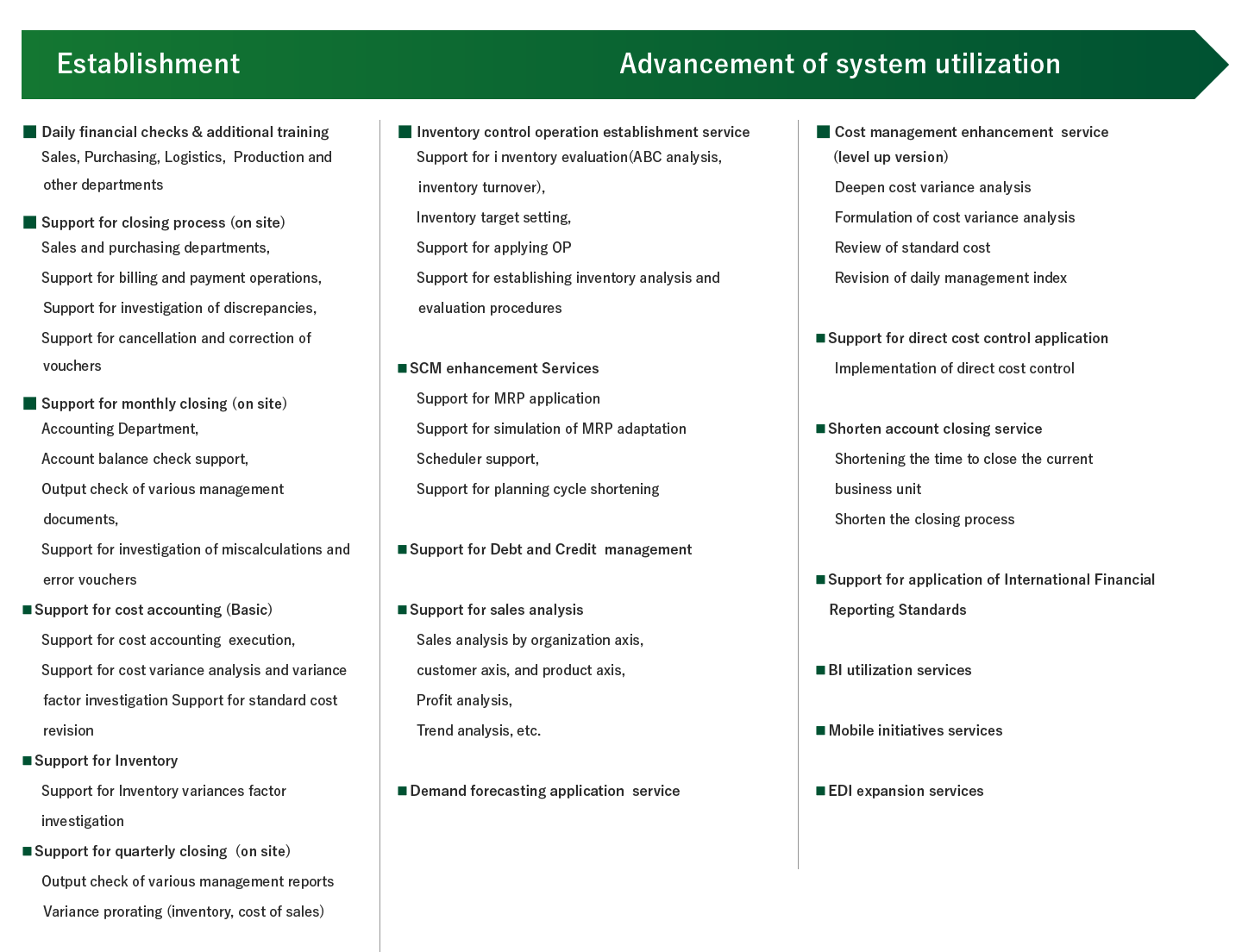
Regular Maintenance Support Main Menu
- Investigation and correction of data
- Investigation and handling of failures
- Responding to organizational changes, system changes, and business operation changes
- Development and modification of forms
- Various program changes and parameter changes
- Utilization support services
Business process, inventory control, production control, credit and debt management, management accounting, cost control, master management, overseas business collaboration, etc.
5-Year Completion Service
We offer a “5-Year Completion Service” aimed at helping our customers maximize the use of ERP to achieve business transformation results. The “5-Year Completion Service” is a service that transfers regular maintenance support, such as handling inquiries and developing changes, to the customer for a period of 3 to 5 years, after which the service is no longer provided by us. By having users learn and acquire the skills to operate ERP on their own, they can build a more autonomous IT utilization organization.
Consulting Services
IT plays an important role in supporting corporate activities, but it is only a tool and a means to solve problems. In order to make good use of IT tools to achieve results, we provide comprehensive services that support planning by selecting the measures required for medium- to long-term management issues, formulating a plan for implementation, and building a promotional organization. The service period and cost will be flexibly proposed according to the issues to be considered and the requested scope of services.
Main Service Menu
- Business management system establishment
- Operations integration
- Supply chain reform
- Sales function enhancement
- Organizational and operational reform conceptualization
- IT organization development
- IT mid- to long-term action plan development
- IT selection and implementation vendor selection support
Key processes for formulating IT mid- to long-term action plans
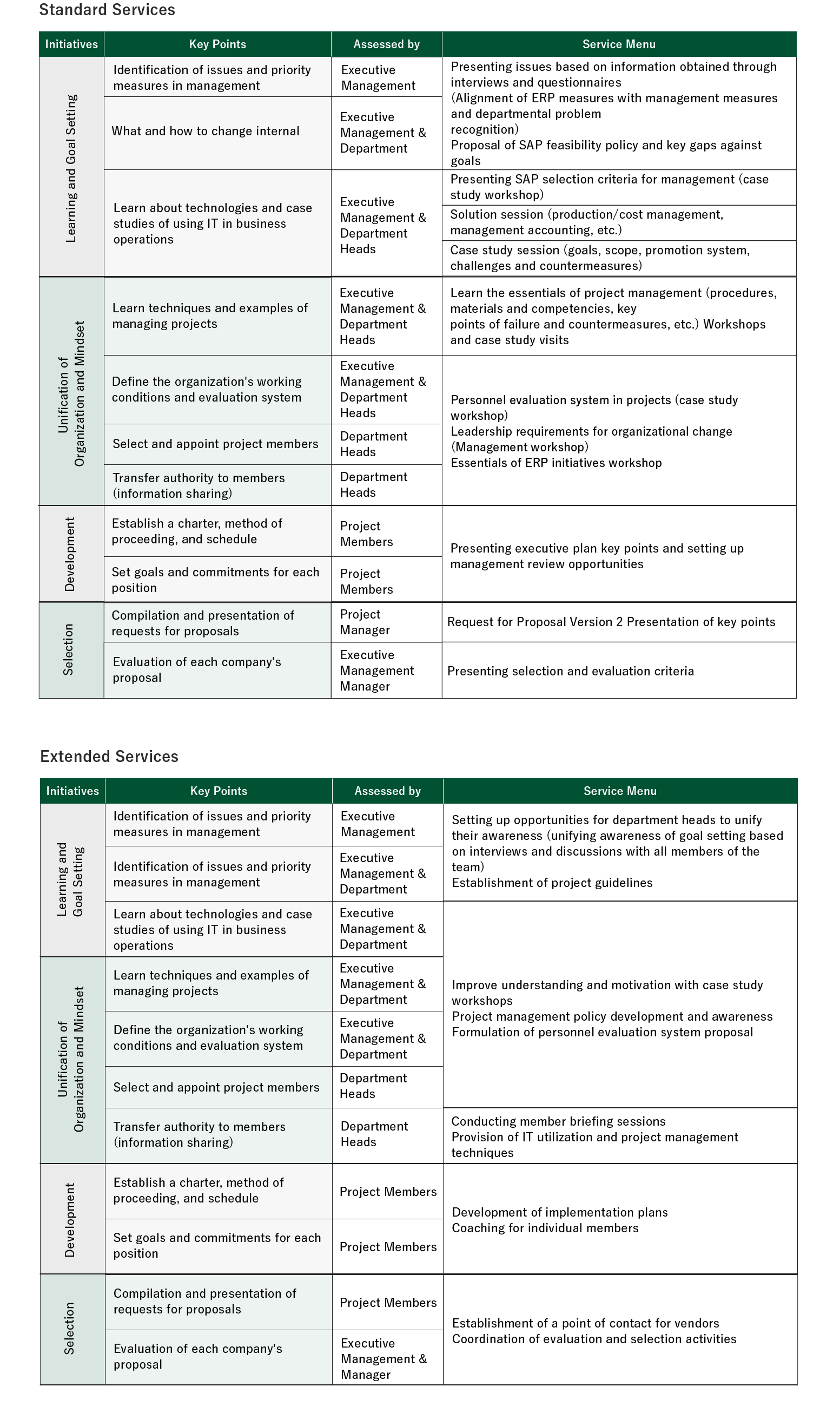
Consultant Referrals
H.W
Approximately 10 years in the planning and management department of a major manufacturing company.
More than 20 years of management experience, strategy development and conceptualization projects.
Experienced in many projects as a project manager of SAP implementation projects.
H.M
20 years of experience in finance/accounting and business planning departments of major consulting firms.
15 years of management experience, system concept and implementation planning support, and as a customer PMO.
Experienced in many projects with a focus on supporting the user company side.
K.M
Engaged in strategic consulting firms for about 30 years.
Experienced in many projects as a management consultant, from developing mid- to long-term business strategies to management advisory services.
Y.I
Project manager of SAP implementation projects and logistics consultant with over 20 years of experience in supporting business transformation associated with SAP implementation and utilization.
EasyOne
“EasyOne” is IPS’s enhanced business system template for SAP. It was the first officially certified by SAP in Asia, and has since been provided on an OEM basis by major hardware vendors and overseas companies.
Currently, it is used by more than 150 companies and related group companies, ranging from large corporations to medium-sized growing companies of various sizes, industries, and business categories. Most of them are big-bang projects ranging from purchase and sale to production, accounting, and global expansion.
EasyOne ~Easier SAP Implementation and Utilization~
We have the necessary systems pre-configured and ready for immediate and efficient use of SAP. In addition, we package operational documents starting with business procedures and system manuals.
EasyOne has a wide range of features. For example, it has an interface that complements SAP’s difficulties, management reports equivalent to 2,000 forms, and functions to improve the efficiency of the manufacturing site, all of which took approximately 800 man-months to develop. This completeness of the system reduces the degree of difficulty for everyone involved in its implementation and utilization.
EasyOne is particularly effective in reviewing and restructuring operations for core system implementation. EasyOne is used as a basis for organizing, systematizing, and standardizing different management levels, business functions, and systems across businesses and processes. EasyOne provides a variety of business procedures, data items, and outputs so that you can create a business model efficiently and without omissions. Typical projects are based on surveys and interviews at each location to define requirements for the business model. Since the quality depends on people and time, it tends to be an extremely risky and difficult approach. Therefore, we approach projects with the “EasyOne” system.
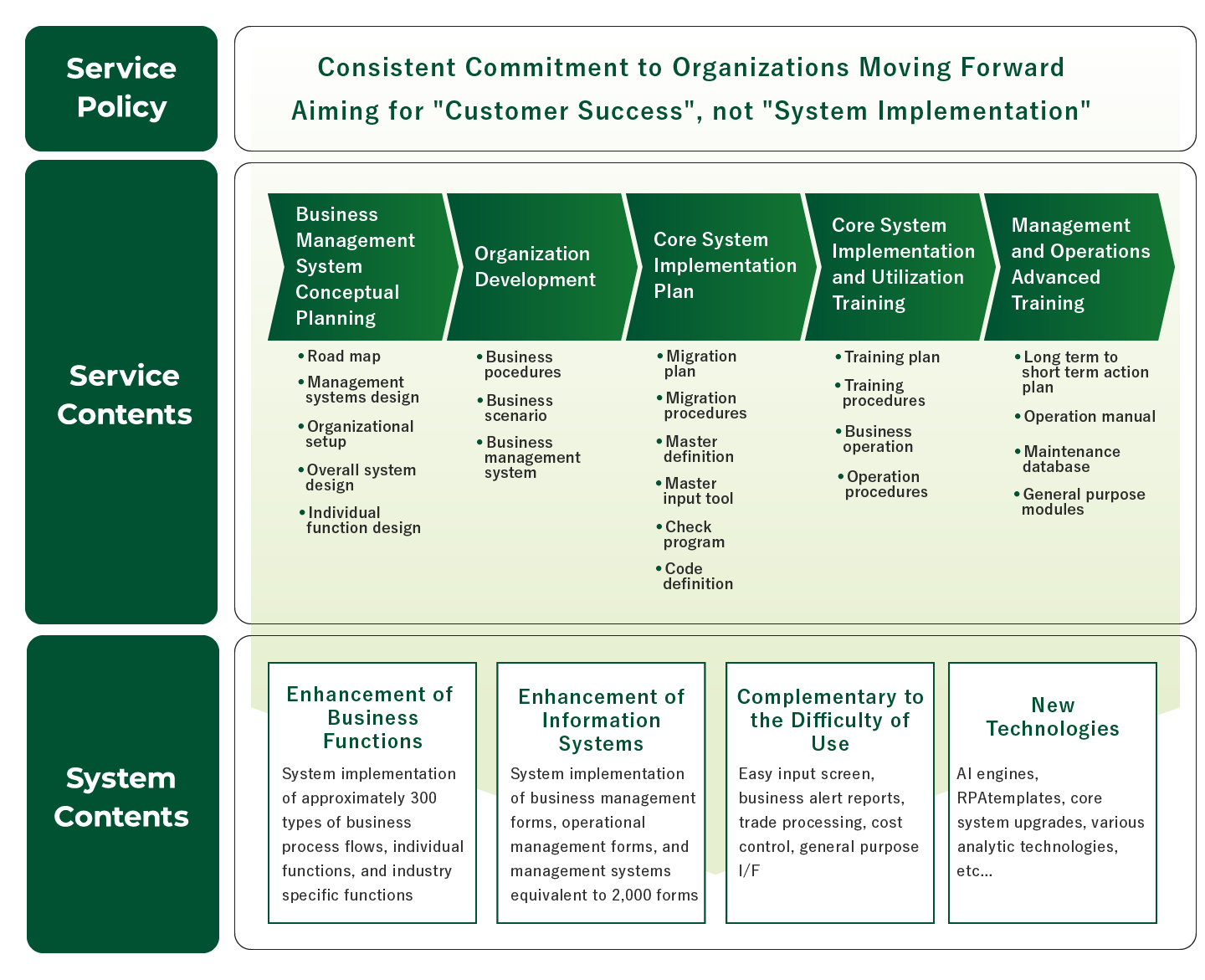
Business Scenarios with EasyOne
EasyOne provides a wide variety of business and administrative procedures for various industries, business categories, and countries. Below are some of the typical business scenarios. We will introduce appropriate business scenarios and examples of use based on the scope of your business.
Sales Management
The entire process from order receipt to delivery, invoicing, and payment is managed. The various sales-related business processes, such as inventory purchase sales, direct sales, etc., for Japanese trading companies, wholesalers, and manufacturing and sales companies are compiled under the heading of sales process. It is designed to be easy and understandable for everyone, covering all management categories, including credit management, consumption tax, purchasing, warehousing at distribution centers, sales standards, billing, credit management, and payment. We also make it easy for customers to incorporate their own unique innovations.
Purchasing, Distribution Center, and Inventory Management Systems
The flow of goods in logistics is managed by linking it to other modules such as the sales process, inventory management, and production management process. Inventory management manages not only the available inventory at each warehouse/distribution center, but also the planned inventory, such as the planned receiving and dispatching schedules. MRP functionality, a major component of purchasing, is also available.
Today’s corporate activities require cooperation between completely different management departments, such as inventory management, purchasing management, and production management, with regard to the flow of goods throughout the company. In addition, the linkage of the flow of goods with overseas countries is one of the important requirements. EasyOne is compiled to visually manage the flow of goods by linking each of these company-wide, yet global, departments. Although the assignment is challenging, it is important for the business scene to be gentle and easy to understand.
Production Control
The production control module manages the planning progress and completion of production through the procurement status of semi-finished products, materials, and other items in a wide variety of factories and processes. We have experience in a diverse range of sectors, from chemicals, materials, components, assembly, and engineering to garments, textiles, and sewing. In particular, overseas collaboration requires the coordination of each module such as production, purchasing, inventory control, export-import, and third-country trading. In addition, we can incorporate the customer’s own manufacturing process innovations into the system to make it more suitable and familiar to the customer.
Factory Manufacturing Costing
Users will be able to perform standard costing (or target costing), monthly actual costing, and variance analysis. The feature of this system is that it is possible to trace back to the original slips and analyze the various causes of the variance analysis from the results of the costing and variance analysis. This enables the sharing of the results of costing and profit and loss control, and the analysis and evaluation of activities according to the scope of responsibility in each department. In addition, profit/loss and cost management can be integrated with daily sales, production, and purchasing activities. It is possible to trace back to the specific sales, production, and purchasing activities that generated the profit and cost variances, analyze problems, and evaluate the effects of improvements.
Accounting
Sales, purchasing, and logistics operations are centrally managed with the accounting area, and the results of business activities are generated as accounting slips, and sales, cost of sales, gross profit, etc. are calculated each time, thus reducing closing procedures. Therefore, financial statements are the accumulation of business activities, and it is possible to return to each business activity one by one.
In addition, we are able to comply with Japanese accounting standards, international standards, and of course, the ever-changing tax system. We are also able to research and collaborate with our global network of United VARs to better understand the ever-changing international landscape.
Project Management
It will be possible to manage projects such as construction properties, machine assembly with individual specifications, plant engineering, and other projects. This enables the entire company to work together to achieve project goals and deadlines by knowing the status of everyone’s projects, the status of work before and after the project, and any changes in budgets, deadlines, materials, etc. In addition, cost accounting is performed on a project-by-project basis to calculate and record work-in-progress assets and cost of goods sold. This allows for a correct understanding of profit/loss for the period, project profit/loss, and divisional or business profit/loss.
Introduction to SAP
About SAP
Global Market Leader in “Enterprise Application Software”
SAP is one of the world’s largest software companies, headquartered in Walldorf, Baden-Württemberg in midwestern Germany. Since its founding in 1972, the company has continued to develop software for business process management and is a world-leading company that is not limited to the framework of providing software, but is a partner in driving transformation for its customers while proactively addressing global issues on its own.
SAP has been and will continue to be at the forefront of providing solutions to the various challenges that companies face in responding to changes in the business environment, business innovation, and the latest technologies. It is SAP’s mission to be able to respond to a world that will continue to change over the next 10 to 20 years.
Supporting the Transformation to an “Intelligent Enterprise”
SAP is supporting companies of all industries, business categories, and sizes to incorporate ERP, IoT, and advanced analytics technologies into their organizational activities to automate operations and enhance management, and to transform into an “intelligent enterprise,” which is a way of being where each and every employee can focus on higher-value initiatives. In this way, SAP aim to enable companies to obtain compensation for their business activities more efficiently, adapt to changes in the external environment, or achieve differentiation in the marketplace. SAP will also contribute to the growth and development of industry, customers, partners, and all of their employees to realize a better society.
SAP Achievements
- Implemented in more than 440,000 companies over the 50 years since its founding ( Executes more than 76% of the world’s GDP transactions)
- More than 4,000 companies in Japan (40% of listed companies are using the system)
- More than 800 Japanese companies with global operations
- Approximately 23,000 global partner companies
SAP Initiatives
Sustainability Management
SAP aims for a world of zero emissions, zero waste, and zero inequality. SAP’s approach to corporate sustainability seeks to generate positive economic, social, and environmental impacts within the planetary boundary, with an emphasis on climate change action, circular economy, and social responsibility.
Corporate Social Responsibility(CSR)
SAP boosts fair access to economic opportunity, education, employment, and a circular economy.
We take the severe issues of global climate change, poverty, and growing inequality seriously, and promote CSR by helping to realize a better world and improve people’s lives.
Utilization of the latest IT technology
SAP invests 18% of its annual revenue in product development and continues to expand its functionality in collaboration with its users. In this context, we also support the latest IT technologies such as AI, IoT, and analytics. Continued use of SAP means that our users always have access to the latest IT technologies that are ahead of the times.
SAP Solutions
We will introduce SAP’s leading product, Enterprise Resource Planning (ERP), and peripheral solutions for effective use of ERP.
Cloud ERP for all business uses “SAP S/4HANA Cloud”
SAP S/4HANA Cloud is a modular, cloud-based system with AI and analytics, making it a versatile ERP. Information on purchasing of raw materials and subcontracting services, production activity time and processes of personnel and machinery, inventory increase/decrease, warehouse management costs, sales prices, sales, receivables, etc. are integrated in real time and flow down to the accounting at the detail level. By using these tools, we can ensure the accuracy and promptness of the financial statements, or manage earnings by department or product cost by single product (management accounting).
In addition, many scenarios are covered for each of these operations, allowing you to select the scenario best suited to your company and build your operations.
The main features are as follows.
①A system that can be adapted to company operations in all types of industries.
Business scenarios are available for a variety of industries, including manufacturing, trading, logistics, finance, and service, allowing customers to select the most suitable scenario for their company and establish their own operations. Moreover, the system can respond to changes in the external environment and changes in the company’s business by selecting scenarios, rather than developing add-ons, so it is flexible enough to solve current problems and to be expanded in the future, making it possible to continue using the system for a long time.
②Global Standard System
SAP is capable of supporting multiple languages and currencies, as well as complying with the laws and regulations of each country, thus making it easy to manage for companies that conduct business with overseas companies. In addition, domestic and overseas group companies can be managed by company code, and through unification of masters and accounts, the system can be used as a common global platform. “United VARs”, a global alliance of SAP partners for mid-sized and growing companies from all over the world with a proven track record in SAP, is also organized, and many implementation partners who can solve various overseas issues are participating in the alliance.
③Technology to assure the quality of operations
SAP has spent 50 years developing integrated databases to improve the productivity of our customers’ mission-critical operations. Many of the determinants of operational quality lie in the quality of information sharing and decision making. Productivity is achieved through the accumulation of collecting, viewing, and correctly judging all management and operational information. The technology that guarantees this is the SAP-only integrated database. Also, By working with SAP’s integrated database, vast amounts of information can be organized and stored and applied to more sophisticated machine learning and automation techniques.
In addition to the above features, we also offer a lineup of solutions for today’s global issues.
- Climate Change Solutions
- Circular Economy Solutions
- Social Responsibility Solutions
SAP Peripheral Solutions
In addition to SAP S/4HANA Cloud, SAP has various peripheral systems in place to effectively utilize SAP S/4HANA. The lineup includes solutions in a wide range of areas, from SCM support such as demand forecasting to human resource (HR) information management, enabling comprehensive support for management decision-making. We would like to introduce some of the most representative peripheral solutions.
- IBP(SCM Planning)
SCM planning support solutions for sales business planning, demand forecasting, and inventory optimization. - Fieldglass(Management of contract and outsourced personnel)
The solution manages the publication of recruitment information, comparison of candidates, ordering of personnel, and work inspection and invoice payment. - SAP C/4HANA(CRM)
Customer management solutions covering everything from pre-order activities to post-sales after-sales service. - Concur(Expense and travel reimbursement)
A solution that enables centralized management of expense and travel expense reimbursement applications, approvals, decisions, and payments. - SuccessFactors(Human resource management)
A talent management solution that manages the recruitment, development, training, placement, and evaluation of human resources and supports the visualization of internal human resources.
About latest SAP solutions
Company segment that has implemented SAP
SAP has an image as an ERP for large companies, but it has been adopted by companies in many industries and sectors, regardless of the size of the company. In recent years, SAP has been adopted by an increasing number of medium-sized and growing companies in particular.
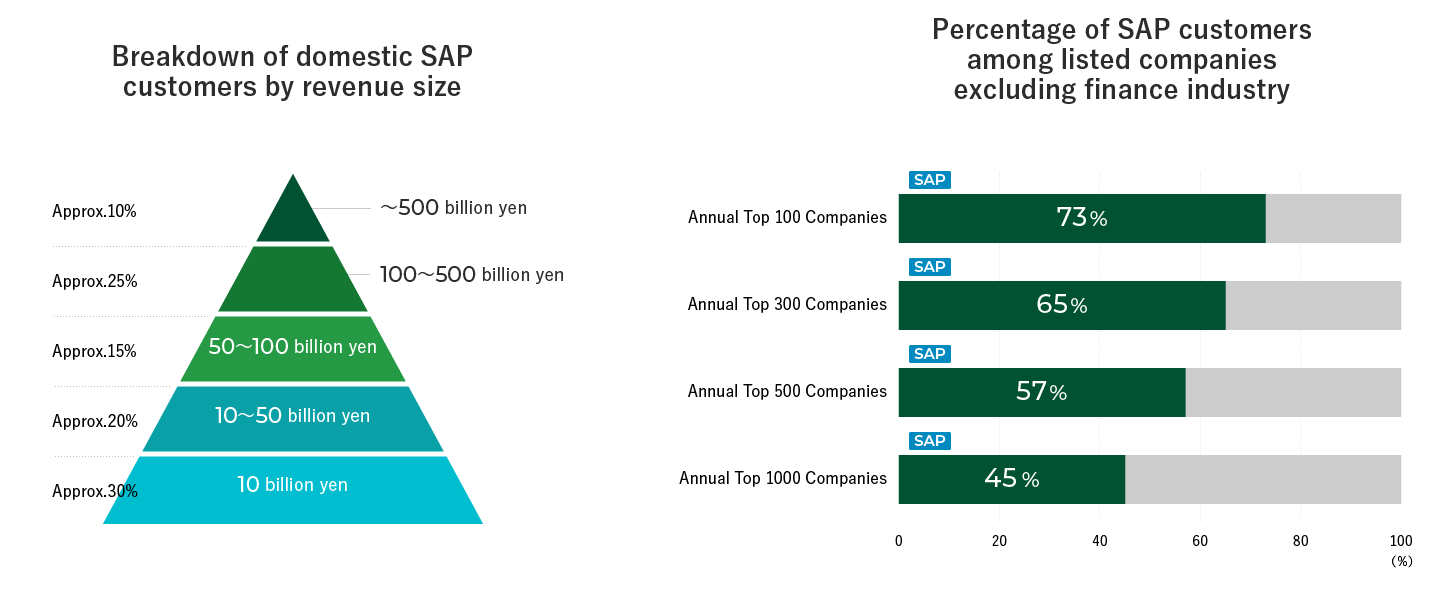
The Changing Role of ERP
The role of ERP itself is changing against a backdrop of changes in the labor environment, such as reforms in work styles and a shrinking workforce in Japan, as well as breakthroughs in the latest IT technologies, such as AI and IoT.
- ERP analyzes “information” that used to be analyzed by humans.
- Transition from a work style that uses ERP to a work style that makes ERP work.
- ERP, which was primarily processing and recording, is now in charge of forecasting and planning tasks.
- AI technology enables ERP to learn business processing know-how that was previously learned by humans.
With the above change in roles, it is becoming more important to “how to master ERP” rather than “how to implement ERP well” in order to let the system handle indirect tasks such as input and registration as much as possible so that people can focus on their main job, which is high value-added work.
Introduction to United VARs

United VARs (value added resellers) is a global alliance of SAP partners for the mid-market from around the world who possess superior industry know-how with a proven track record in SAP. Certified with the highest SAP status as Platinum Partner, we count with the leading solution providers across the world to guarantee the best service and support for your international roll-out projects, ERP optimization projects and cross-border nearshoring.
IPS has been a member of the United VARs since 2011 as a representative of Japan and a member of the steering committee as a representative of Asia, based on the recommendation of SAP SE and SAP Japan.
In cooperation with the Alliance Group, IPS can deploy and execute projects to support companies that are planning to expand overseas or into Japan.

Global Expansion through United VARs
Multicultural
Overcoming differences in local legal systems, language, and culture
Your international project is a home game for our consultants. With on-site solution providers, we deliver
the best local-in country expertise, we know the respective language and culture and we are always up-to-date about local & legal requirements and changes. Tailored to your needs, we offer both global and local service and support in the needed timezone and languages, from planning to implementation and after going live.
Mid size market leaders
Mid size market leaders
Only hand-selected SAP solution providers are admitted in our alliance. Every United VARs member has many years of experience with SAP projects in the mid-sized industry and in dealing with SAP industry templates. For this reason, we can provide you with best practices in business processes and transform technology into new business models with more business benefits for you.
Global Reach
Global reach to more than 100 countries
Our network covers the most important markets in more than 100 countries worldwide. Prime solution
providers, your closest partners, lead projects worldwide according to global project standards.
Integration Experts
System Integration Expert
We help you to create transparency in your subsidiaries, by integrating business processes, connecting your international customers and creating uniform reporting. Your headquarter is up-to-date about your subsidiaries.
Opportunities for SAP Implementation Vendors to Leverage United VARs
Domestic SAP implementation vendors also have the opportunity to share resources through the United VARs network and leverage the rich experience and solutions of the Alliance members to expand your business globally.
Global collaboration projects
グローバルチームとのコラボレーションプロジェクト
United VARsに加盟している経験豊富で各地域の要件に精通した現地コンサルタントと共に、ロールアウトプロジェクト、ERP最適化プロジェクト、クロスボーダー、ニアショアリング、オフショアリングプロジェクトなど、グローバルでより大きなSAP導入プロジェクトを手掛けることができます。アライアンスの活用で一社では成しえない事を達成する。これが正にUnited VARsが”Stronger than One”である所以です。
If you are interested in utilizing United VARs, please feel free to contact us.
IPS Implementation Records
Over the past 25 years, we have been the project prime contractor for 150 companies, ranging from major corporations to medium-sized growing companies.
*Implementation in group companies is counted only in one parent company.
Diversity of Project Scale
We have experience in projects ranging from small-scale projects for companies with less than 30 employees using cloud services to large-scale projects for large companies with more than 1,500 employees that integrate 15 global locations into one using SAP.
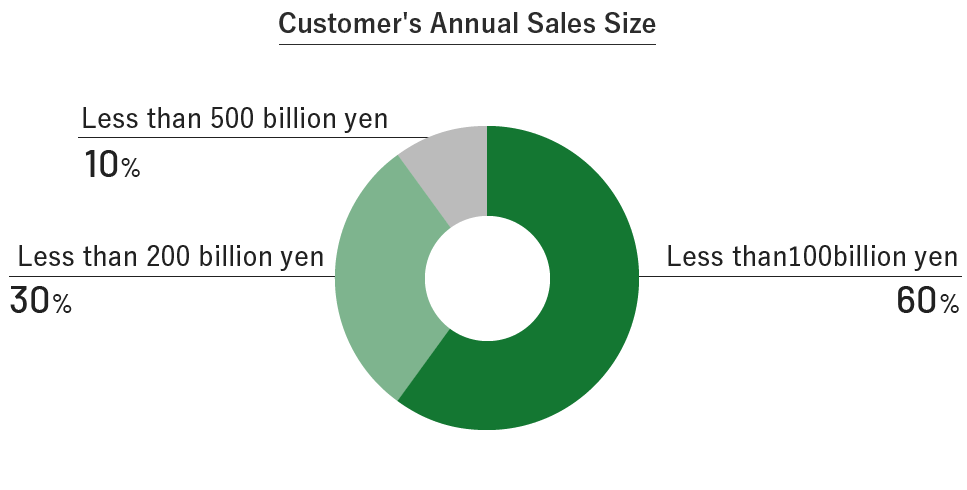
Diversity of Industries and Themes
We have experience in many industries, from manufacturing to trading and wholesale.
Our template EasyOne is a product that encompasses industry specificity. We have also experienced many projects with a wide variety of themes.
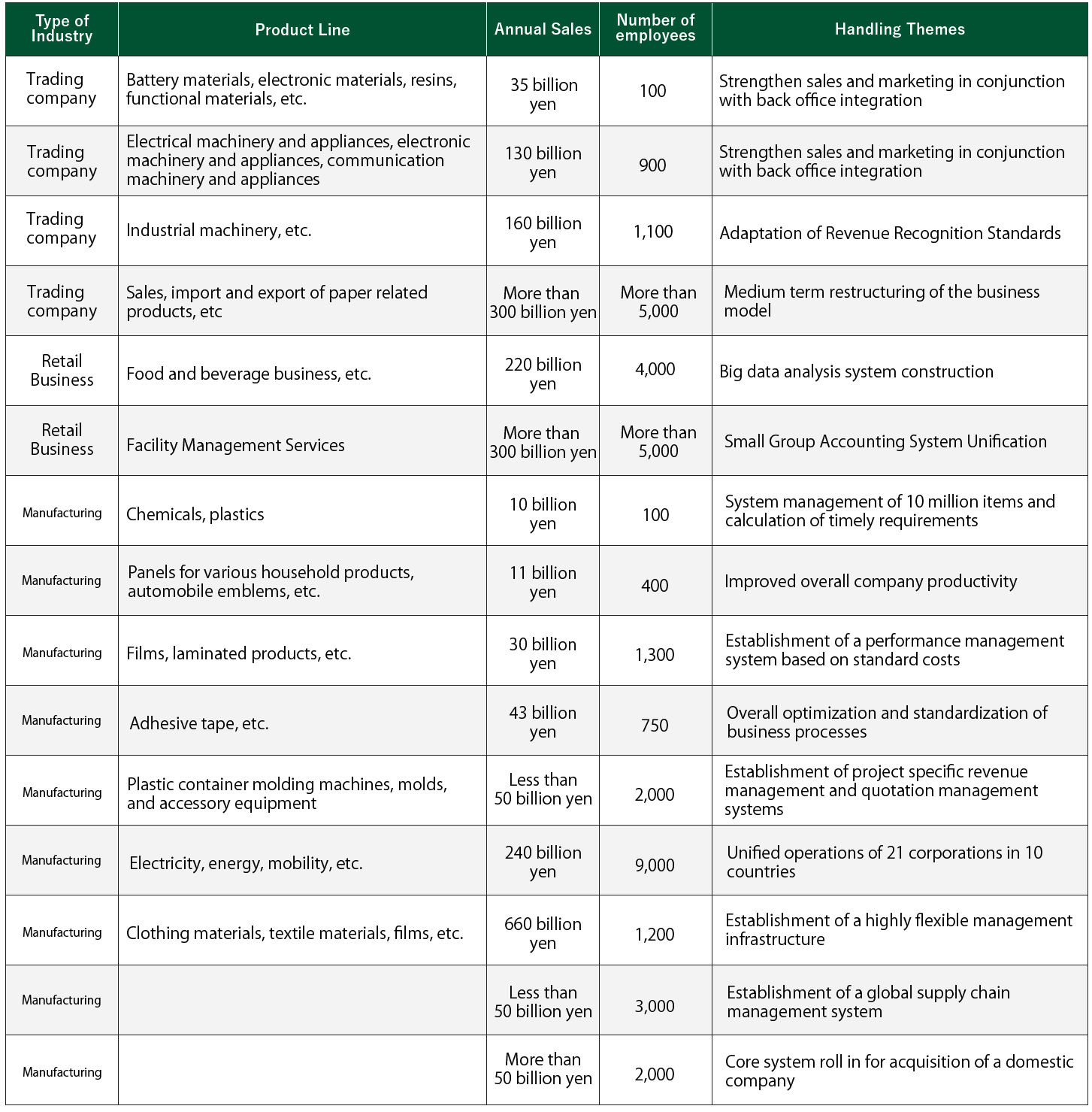
Diversity of the Country
IPS implementation Record
In recent years, the United States and China have been the regions with the most successful results.
To date, we have implemented more than 100 overseas offices.
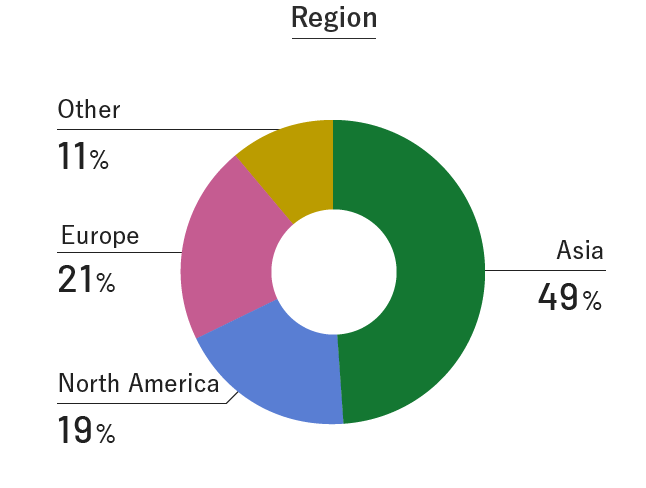
United VARs covers global deployment
United VARS, of which IPS is a member, has more than 70 partners representing countries around the world and covers approximately 100 countries through its cooperation.
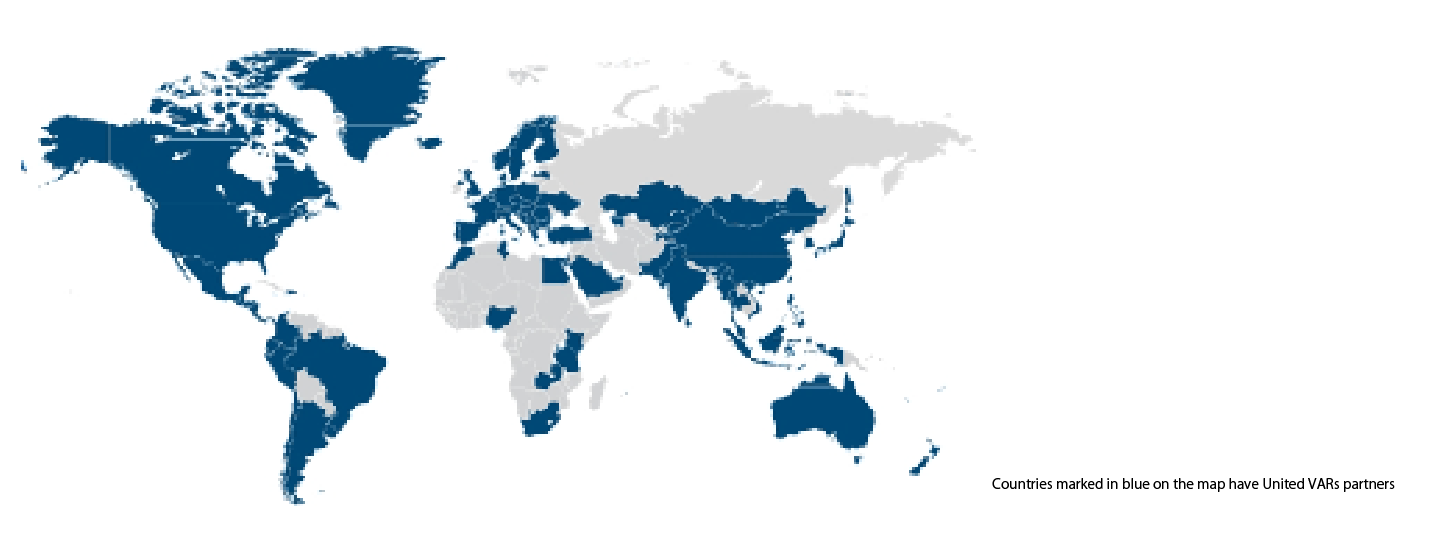
IPS Case Studies
Nichiban Co., Ltd
Business transformation and data utilization contribute significantly to the advancement of the medium-term management plan
Nichiban Corporation, a manufacturer and seller of adhesive tapes and medical tapes, selected SAP S/4HANA to achieve “evolution and deepening” and “transformation,” which are the cornerstones of its mid- to long-term vision “NICHIBAN GROUP 2030 VISION. The entire company went live in April 2022 after a phased startup in April 2021. Even after the full-scale operation, they launched the “Core System Operation Project” to further promote the optimal allocation of organizations and personnel by utilizing digital technology, and are also promoting the deployment of the system to their overseas locations.
Company Profile
| Founded | January,1918 |
| No. of employees | 1,255 (as of March, 2022) |
| Capital | JPY 5,451 million |
| Sales | JPY 43.134 billion (as of March, 2022) |
| Industry | Manufacturing |
| Business | Manufacturing and sales of various adhesive tapes |
| Implementation Details | Implemented S/4HANA purchasing management, sales management, production management, financial management, and management accounting |
| Implementation Timeframe | From April 2020 to April 2022 (Phased implementation April, 2021: Accounting, Production & Purchasing / April, 2022: Sales) |
Background of Implementation
The company manufactures a wide range of products from medical materials to office supplies, and its operations were being managed by an extremely complex system. Prior to the system replacement, the systems had been built in an individually optimized manner, and the core systems such as the accounting system, purchasing system, and sales system had been built using proprietary packages or scratch development, which was a hindrance to the realization of the new medium-term management plan from the IT perspective.
Effects of Implementation
The key theme of the new medium-term management plan “ISHIZUE 2023 – SHINKA Transformation” is “active use of AI and IoT to promote business strategies,” and in order to change from the current “vertical and individual optimization” to “cross-organizational and overall optimization,” the business processes were optimized and standardized. SAP S/4HANA was fully utilized to successfully “transform” a series of company-wide business systems from sales/production planning to production/cost management in just one year.
Factors that made it possible to implement SAP in a short period of time
- Top-down company-wide awareness
- Conduct proper research and planning in the preparation process prior to implementation
- Thorough use of standard functions and templates
- Project charter to unify members’ awareness and clarify decision-making criteria
Initiatives for the Future
In order to realize the mid-term management plan [ISHIZUE 2023 ~SHINKA, Transformation~], by renewing the core system to a global standard integrated enterprise resource planning (ERP) system, the company is organizing core operations (structuring/standardizing after identifying business characteristics and forms) and integrating systems/data (structuring and standardizing ) and strategically utilizing data.
Sanwa Screen Co., Ltd.
The first step in digitization is to standardize and store on-site information in data format
Sanwa Screen Co., Ltd. an automotive parts manufacturer, faced the limitations of its long-standing hand-developed system and decided to implement the cutting-edge cloud ERP package “S/4HANA Cloud”. The company chose S/4HANA Cloud because of the completeness of the cloud solution, the high accuracy of information, scalability, global compatibility, and continuity of new technology, and has been working on continuous “digitalization” throughout the entire company.
Company Profile
| Founded | May,1979 |
| No. of employees | 1,411 (non-consolidated:357) (as of Semptember, 2022) |
| Capital | JPY 42million |
| Sales | JPY 9.459 billion (as of September, 2022) |
| Industry | Manufacturing |
| Business | Planning and production of panels for various home appliances Planning and manufacturing of automobile emblems, etc. |
| Implementation Details | Implemented S/4HANA Cloud purchasing management, sales management, production management, financial management, and management accounting |
| Go live | January 2023 |
Aims of Digitization
- Standardize and streamline indirect operations so that we can focus on “Monozukuri” (manufacturing).
- Visualize the “now” of the Sanwa Group so that the current status of production and sales can be accurately grasped.
- Realize and strengthen management accounting to speed up management.
- Unified management of the minimum data that forms the framework of products, such as raw materials and processes.
Problems with the existing system
●System aging
- Fundamental modifications are required to solve the problem.
- Repeated modifications are making the specifications more complex and difficult to modify.
- The latest tools and functions are not available.
●Non-standardization of systems
- Various similar systems are disorganized because they are optimized in each office and department.
●System is too personalized
- Becoming a bottleneck for various domestic and overseas
- Almost impossible to outsource improvement projects
- Problematic from the perspective of BCP
Effects of Implementation
- Increased productivity due to standardization and systemization of operations
- Relief from the burden of system operation
- Continuously changing structure and organizational scalability with IT

